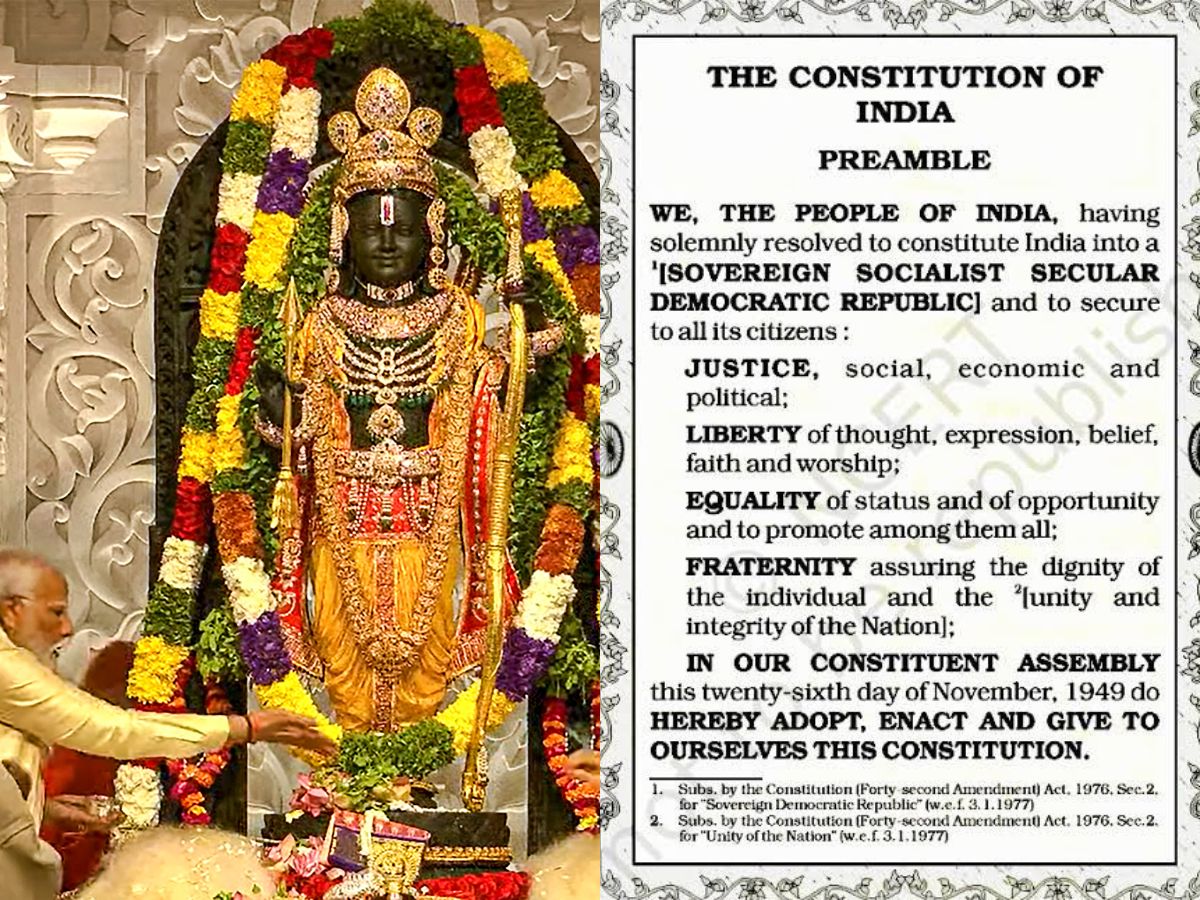
While Prime Minister Narendra Modi Ayodhya welcomed Ram Lalla idol at the newly constructed temple in Ayodhya, Uttar Pradesh, on Monday, January 22, heralding the beginning of so-called ‘Ram Rajya’, several well-known actors, and filmmakers from the Malayalam film industry posted images of the Preamble of the Indian Constitution on social media platforms.
Actors such as Parvathy Thiruvothu, Rima Kallingal, Divya Prabha, Rajesh Madhavan, Kani Kusruti, directors Jeo Baby, Aashiq Abu, Kamal KM, Kunjila Mascillamani, and singer Sooraj Santhosh shared photos of the Constitution’s Preamble.




What does the Preamble of the Indian Constitution say
The Preamble of the Indian constitution describes it as a Sovereign, Socialist, Secular and Democratic Republic and declares to secure Justice, Equality, Liberty and Fraternity to all the citizens of the country.

“We the people of India, having solemnly resolved to constitute India a into a Sovereign, Socialist, Secular, Democratic, Republic and to secure to all its citizens:
Justice, social, economic and political;
Liberty of thought, expression, belief, faith and worship;
Equality of status and of opportunity and to promote among them all;
Fraternity assuring the dignity of the individual and the unity and integrity of the Nation;
in our Constituent Assembly, this twenty-sixth day of November, 1949 do Hereby Adopt, Enact and give to ourselves this Constitution.”
Kerala unenthusiastic
While the nation immerses in the enthusiasm surrounding the newly inaugurated Ram Mandir, the southernmost state of Kerala has relatively been immune to the fervour.
Even as Governor Arif Mohammed and several BJP leaders visited the Remadevi temple at Thiruvananthapuram, many locals displayed low interest in participating in special ceremonies organised by temples on the occasion of the pran prathista ceremony.
BJP party president K Surendran blames the ruling CPI (M) party and the Congress for allegedly ‘isolating the majoritarian Hindu population on rare occasions of joy and celebrations.’
Meanwhile, the Marxist party consider the grandeur as a stepping stone for the BJP to gain political mileage given the upcoming Lok Sabha elections.
Speaking to the media, CPI (M) state committee member M Swaraj said, “Lord Rama, once a symbol of spiritual reverence, has been relegated to a mere political pawn. The government bears the responsibility to steer the nation in accordance with the Constitution. As a secular state with no official religion, citizens retain the right to practice any religion of of their choosing. When a prime minister partakes in religious actions, it conveys a message that we may be jeopardising our commitment to secularism and democratic principles.”
Brief history
The recently inaugurated Ram Temple in Ayodhya stands on the historic site where the 16th-century Babri Masjid once stood. While the Hindutva elements claimed Babri was built on the ruins of a temple that was razed down by Muslim invaders, the Muslim community deny the claim.
On December 6, 1992, a mob of Hindu nationalists, led by then senior BJP leaders LK Advani, former Prime Minister late Atal Bihari Vajpayee and Uma Bharati among others, marched towards the mosque and demolished it.
The dispute over the ownership dragged on for years when in 2019, the Supreme Court of India gave the verdict in favour of the Hindu groups.
The Bharatiya Janata Party had long promised the construction of the Ram Temple, and its inauguration is anticipated to bolster the party’s prospects in the upcoming Lok Sabha elections. The temple’s establishment marks a significant chapter in India’s socio-political landscape, reflecting the complex historical and religious dimensions surrounding the Ayodhya dispute.
The Ram temple has been one of the major poll promises of the Bharatiya Janata Party. The temple’s inauguration, reflecting India’s changing socio-political landscape, is anticipated as a catalyst for the saffron party in the upcoming Lok Sabha elections.



